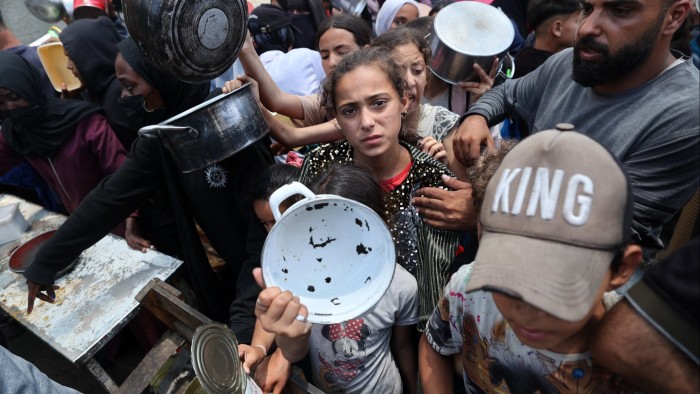Unlock the Editor’s Digest for free
Roula Khalaf, Editor of the FT, selects her favourite stories in this weekly newsletter.
The World Food Programme has launched a “comprehensive review” of its partnership with Boston Consulting Group as a backlash mounts over the US consultancy’s work on a controversial project in Gaza.
The Financial Times reported last week that BCG had modelled the costs of relocating Palestinians from Gaza. It also helped establish the Israel- and US-backed Gaza Humanitarian Foundation, whose role in distributing aid in the enclave has been marred by the deaths of hundreds of Palestinians.
The WFP, which has had a global partnership with BCG since 2003, said it was not aware of the consultancy’s relationship with GHF until it became public.
It expressed its “shock and grave concerns” about both the relationship itself and BCG’s “lack of transparency in not having informed us” of it.
“WFP is emphatic that the work of its partners aligns with our core values, mission and policies. Given these recent revelations, WFP has begun a comprehensive review of its work with BCG,” the UN agency told the FT.
BCG said: “We value our long-standing partnership with WFP and look forward to continuing to support their work in the future. We will work constructively as they go through their review.”
BCG had worked with the WFP on hundreds of projects on a pro bono basis, said a person familiar with the situation.
The consultancy has said that the two partners involved with the project on Gaza were carrying out unauthorised work, and it fired them last month. It has hired the law firm WilmerHale to help review its processes.
The move by WFP, one of the few groups that provides desperately needed food to Palestinians in north Gaza, comes amid growing scrutiny of BCG’s work on the shattered enclave.
A UK parliamentary committee has ordered it to explain its activities in Gaza, while the charity Save the Children suspended its partnership with BCG on June 13, shortly after the consultancy first acknowledged its work with the GHF.
GHF began operating in May and runs four aid distribution sites in Gaza, which has been devastated by the 21-month offensive launched by Israel in response to Hamas’s October 7 2023 attack on Israel. The UN has warned that Gaza’s entire 2.1mn population is at risk of famine.
GHF’s militarised system, which breaks with traditional humanitarian models, is staffed by US private security contractors and guarded by Israeli forces, a set-up that Israel argues is needed to prevent aid being diverted to Hamas.
However, the UN has described GHF as a “fig leaf” for Israel’s war aims, and humanitarian groups have refused to co-operate with it. Since GHF’s launch, more than 500 Palestinians have been killed trying to reach its distribution sites, according to the UN.
The FT reported last week that, as well as helping to establish GHF, a BCG team built a financial model for reconstructing Gaza, which included cost estimates for the voluntary relocation of hundreds of thousands of Palestinians from the territory and the economic impact of such a mass displacement.
BCG has said it will not collect any of the $4mn it planned to bill for the work with GHF, and that the partner leading the modelling work had done so despite being ordered not to.
BCG’s chief executive, Christoph Schweizer, acknowledged in a memo to alumni this week that the incident revealed “process failures”. He promised a “firm-wide remediation effort”.
“Even if this was not in any way, shape or form a formal BCG project, our association with it is real, deeply troubling, and reputationally very damaging,” he wrote.



